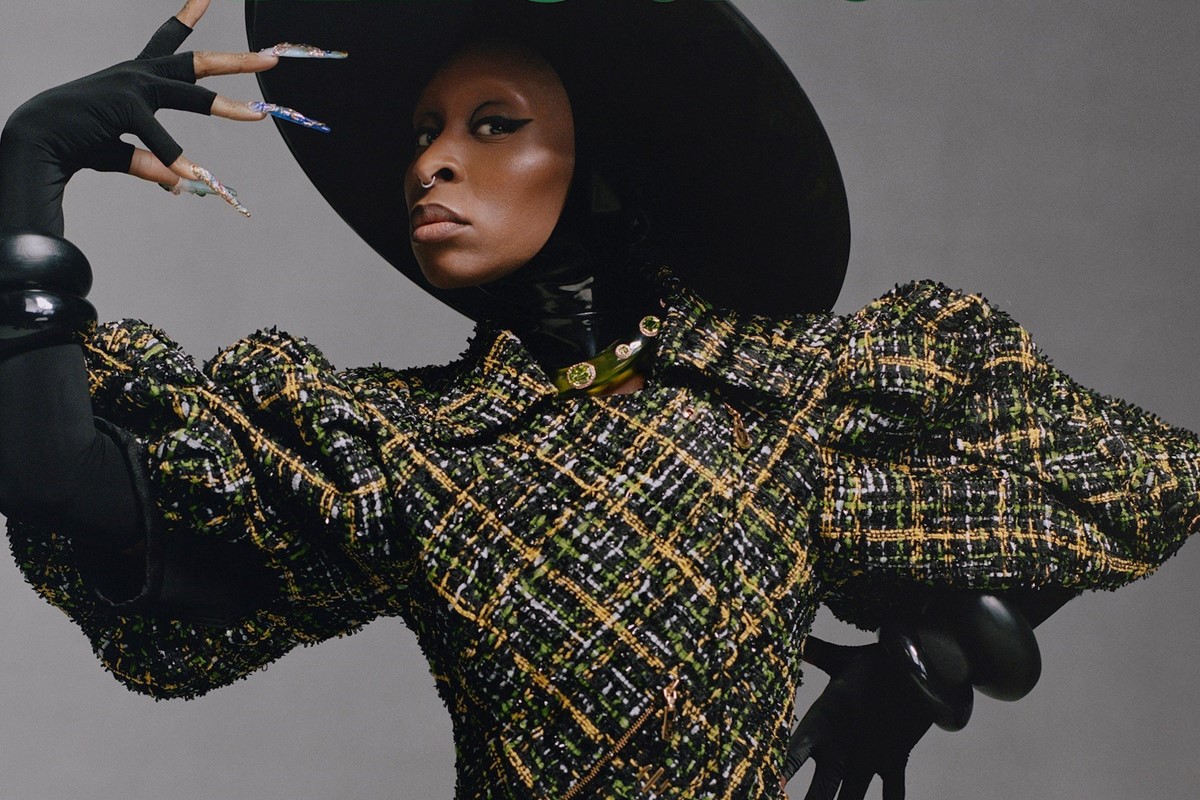
Rewrite
Lead ImageJacket and trousers in cotton silk by LOUIS VUITTON. Hat and hood in latex by ATSUKO KUDO. Her own nose ring. Choker in acetate with crystals by SWAROVSKI. Stylist’s own gloves. Bangle in resin by DINOSAUR DESIGNS. And bangles in Lucite by ALEXIS BITTARPhotography by Nadine Ijewere, Styling by Katie Shillingford
This article is taken from the Spring/Summer 2025 issue of AnOther Magazine:
Our first meeting was chance. Cynthia Erivo was in Thom Browne’s showroom in Paris last March, picking out looks for a press tour for her forthcoming movie, Wicked.
When we next meet, nine months later, over Zoom this time, the world has changed for her. “Just a little bit, yeah,” the 38-year-old acknowledges with a dry laugh.
Wicked has been Hollywood’s salvation, a box office titan, with a global gross thus far of over $700 million. And Erivo has just hit her first red carpet of awards season, for the Golden Globes, where she was nominated for best actress in a comedy or musical (she has since received an Oscar nomination too). In the past she has often found award shows nerve-racking. But that is also different now.
Erivo has joined the pantheon, via her role as the green-skinned Wicked Witch of the West in one of the most celebrated and enduring fairy tales of modern times. The witch in the original film adaptation guaranteed nightmares into adulthood for generations of young innocents. Wicked is a revisionist text, recasting evil as persecuted otherness. And that’s how an all-singing, all-dancing Hollywood musical becomes an unexpectedly subversive commentary on a world where the swelling tide of authoritarianism is chillingly reflective of the moment in history when The Wizard of Oz first appeared on movie screens, in 1939. Erivo’s witch, Elphaba, finds common cause with the downtrodden souls of Oz.
Even though Wicked is the second most successful musical in Broadway history and has been on stage for more than 20 years, including playing at the Apollo Victoria in London since 2006, I didn’t know it at all. But this was a rare instance when ignorance actually was sheer bliss. Which felt like a launchpad for our conversation.
Tim Blanks: I blush to admit I had no idea what to expect from Wicked.
Cynthia Erivo: I don’t think people do, and that might be what’s catching people unawares. I think people go in expecting a light, fun time and they come out moved, which is wonderful, the idea that you really can do both. We want people to go in and enjoy themselves. We want people to sing, to dance, but we also want them to understand that humanity exists and that we can do better as human beings, do better with each other. We can change our minds. We can be brave. We can. We can go beyond what the expectations of ourselves are.
TB: Speaking of … You appeared on Graham Norton when you’d just done the Aretha miniseries [National Geographic’s Genius: Aretha] – you were a London girl talking one second and the next you’re Aretha Franklin singing I Never Loved a Man. From one second to the next. Goosebumps don’t even begin to describe how I felt. I was sitting there thinking, how do you inhabit someone so totally and then leave their house and move into a new character? How do you do that?
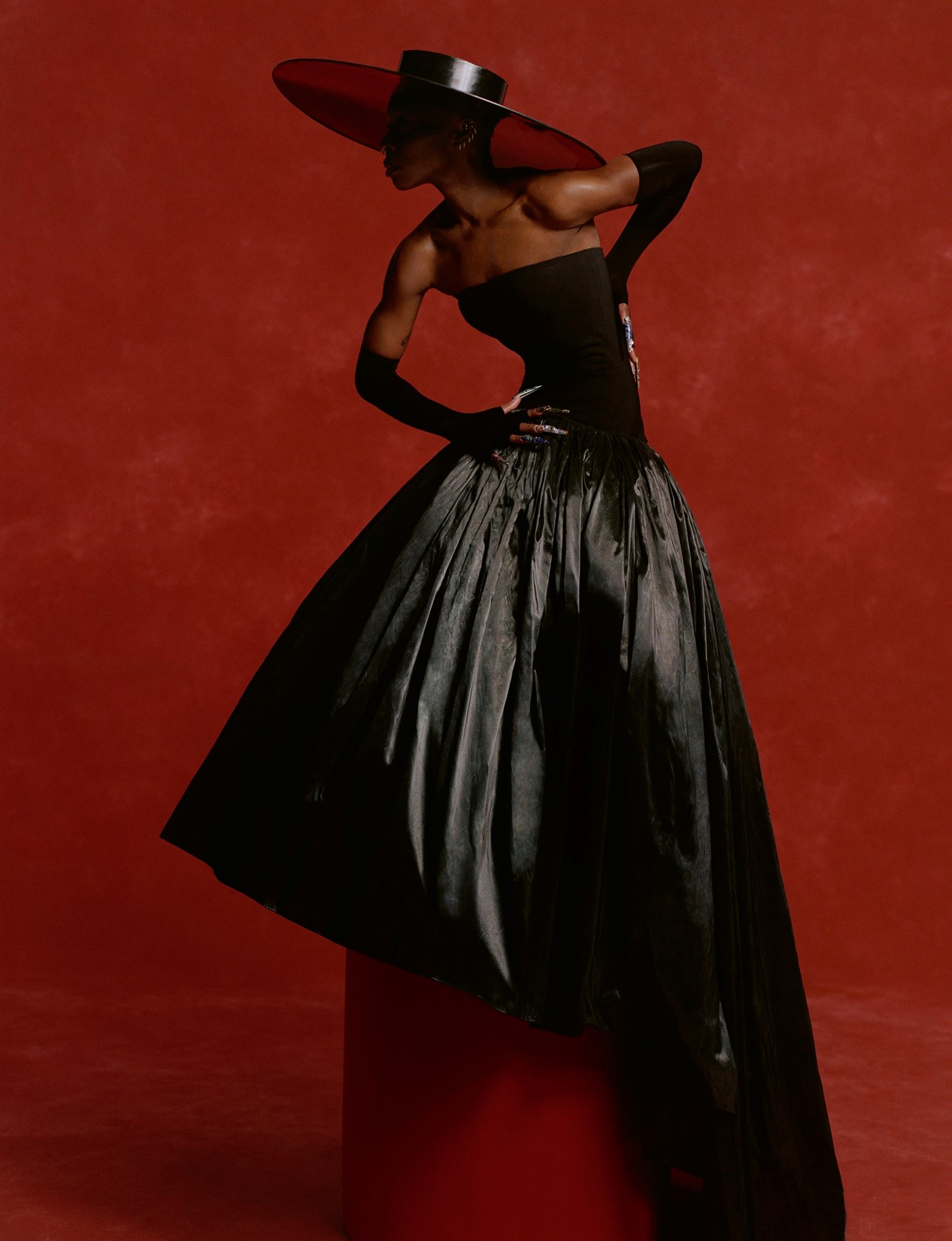
CE: I don’t know. Sometimes it’s difficult. I’m not entirely sure that they leave my house after I’ve left theirs. I think I always leave with a little bit of them with me, they’re always there beneath the surface. I don’t know how not to give each of the characters an actual part of myself. I don’t know how not to pour myself into the character. I think I’ve got very good at making sure that I take the time at the end of these projects to let them go a little bit and make some space for myself to come back in. I want to be able to give myself fully to whichever character comes along next. I think it’s because I really do care deeply about each of these characters. They become people I love.
TB: Have you ever played anyone you didn’t like?
CE: No, I don’t think so. And I don’t think that will ever be the case. Even if I play a villain, I reserve judgment, because they’re a human being. I can’t judge that character because I have to be them. I have to believe what they believe and that they are fully justified in what they’re doing. And if I believe they’re fully justified, unless the character innately doesn’t like themselves, then I doubt that I wouldn’t like them.
TB: That sounds emotionally taxing. To do that as a job … How do you cope? Is that why you run marathons?
CE: I think it is. I think it’s why I started running and walking long distance. It was a wonderful way to meditate, to process and to let go of some things. I have an amazing therapist. But it does take a second. Like, my heart always aches at the end of something. I find it hard to leave at the end of a piece. Really hard.
TB: So Wicked is quite a different experience for you, because you were so submerged in the creation of it, and with Wicked 2 [Wicked: For Good] on the horizon you will be equally taken up with the promotion of it for another year. Tell me about that experience.
CE: It’s been wild, because it’s not really ever letting Elphaba go completely, because when I have these conversations she’s still right there at the surface. And even having to go back to the second film, and rewatching and reliving some of those moments, is going to be another wild and crazy experience. We’ve only just come past the first and, even now, we’re still talking about it and we’re still moving through it. And I think what keeps it with me is all the conversations I keep having with people who I’ve never met before, people who come up to me in the middle of the street and say, “Hey, I saw the film, I don’t feel alone any more.” I recognised that. I got a text from a friend of mine. He said, “My ninety something grandmother went to see the film and she sobbed, ‘It’s the first time I’ve seen myself on screen.’”
TB: And what they’re seeing is a green witch! That is the amazing thing.
CE: It’s a green witch. But I think what they see also is so many parts of me. There’s a deep understanding of what it feels like when you don’t fit, what it feels like to constantly want to be accepted and not be accepted, what it feels like to know what your responsibility is and to have to be brave enough to take it, what it feels like to feel like you have more to offer but nobody believes that you have that in you. All of those things that this character and I both innately understand, I think other people are also seeing and understanding. And we talk about the braids and the nails. Because, yes, the green is there, but those braids tell you something different as well. There’s also the added wonderful thing of Black women seeing themselves on screen. They see themselves flying on screen. And we just don’t see that very often.
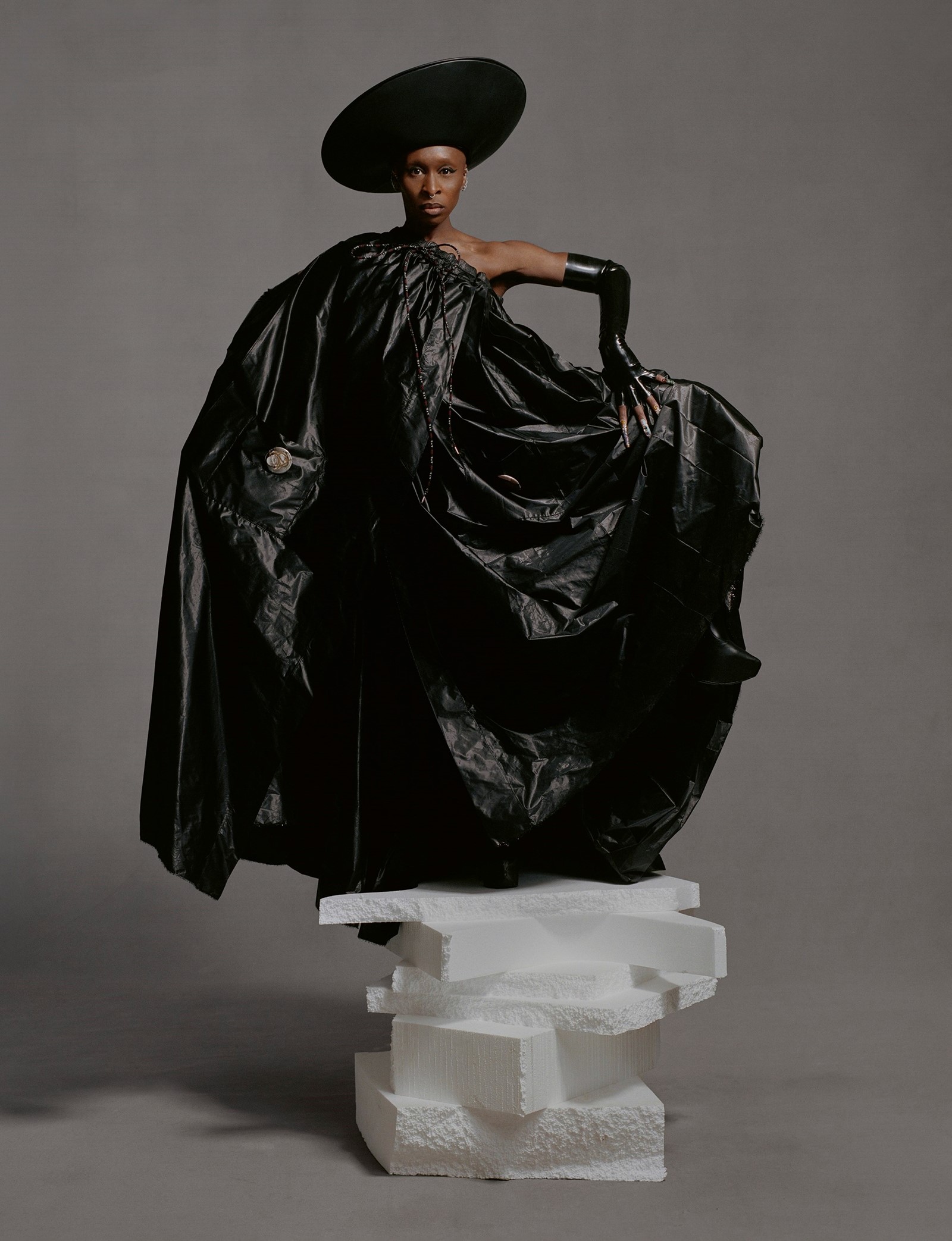
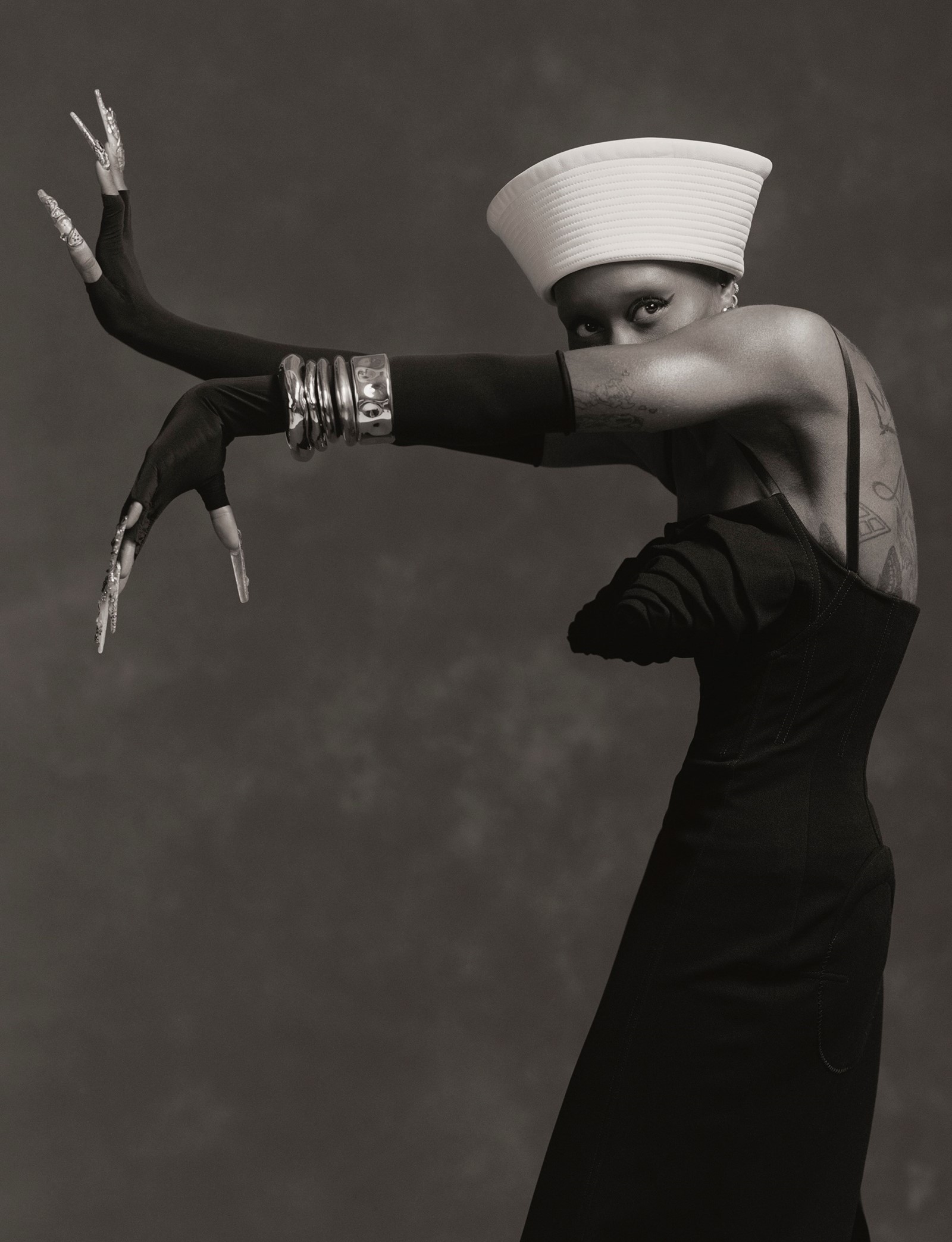
TB: You have talked about how being bullied as a child informed Elphaba’s experience in the film. I’m thinking in particular of the solo dance scene at the Ozdust Ballroom [a soaring emotional high point in Wicked].
CE: In my late teens I definitely walked into a room and felt like I wasn’t meant to be there.
TB: Did you claim your space?
CE: I don’t think I did. I don’t think I knew how to. I think this role gave me the chance to. I guess that dance was for me and for Elphaba, and for anyone who has never been able to take back their space. I’m aware now of how different I am, whether it’s what I look like or how I see fashion or how I see music. And I nurture those differences. I don’t try to hide them. I’m very comfortable sitting here in front of you, no make-up, no eyebrows, nothing. I remember the decision I made when I was at drama school, wanting people to see more of my face and going, “I don’t think I have any use for hair. I’m just going to cut it short.” And it’s been getting shorter and shorter until Wicked, and the only way to make sure that that wig made sense was to shave my head and we airbrushed the green paint onto my scalp. We airbrushed my entire head. For Aretha I had to shave my eyebrows halfway. I kind of liked it. And then I was like, oh, maybe I don’t need eyebrows either. The more it’s weird, the more I let go, the more I feel like myself. Right in this moment I feel very much like me.
TB: Well, that’s acting as therapy, isn’t it?
CE: I do think so. I think that it’s therapy for the actor, but it’s also a wonderful way to channel emotions you haven’t necessarily been able to use, feelings you haven’t been able to express. If you can put them in a vessel that can actually express them for you, they don’t live in you as much.
“I’m aware now of how different I am … And I nurture those differences. I don’t try to hide them. I’m very comfortable sitting here in front of you, no make-up, no eyebrows, nothing” – Cynthia Erivo
TB: Do you think the green skin allowed you to express your feelings about racism in a much more graphic way? Without giving people what they’ve seen from you in the past – Harriet Tubman’s experience of racism, or Celie’s experience in The Color Purple – you distil the experience into something much more comprehensible. It’s hard to put my finger on it exactly. It’s literally alien.
CE: The green skin is like the umbrella under which the ‘other’ lives. So yes, it’s a conversation about racism, but it’s also a conversation about anyone who’s been othered. It’s a conversation about queerness. The green sets Elphaba apart from everybody else. She is the ultimate other. And I think there’s this added responsibility because I’m a Black woman underneath that green, so we can also really have the conversation about what it’s like to be a Black woman when nobody wants you there. I mean, you’re gonna have a frank conversation. And I think the wildest thing is that people are. People are raising their hand, going, “I felt like that, I know what that is.”
Wicked’s director, Jon M Chu, observed that Wicked: For Good, arriving this November, will likely be even more relevant than its predecessor, given what’s happening in America now. But Erivo has already displayed a knack for timeliness in her career. She went to New York in 2015 with the Menier Chocolate Factory’s production of The Color Purple and won a Tony the following year, the same year that Hamilton blew the roof off Broadway. “It landed right when it was meant to land,” Erivo says. Her performance as the American abolitionist and activist Harriet Tubman won her an Oscar nomination for best actress in 2020. “It did what it did when it needed to do it,” she adds. “And now this. I think I definitely have a little guardian angel going, ‘Do that, pick this.’”
At this point I’d like to extend a special thank you to Erivo’s guardian angel for bringing her to the HBO series The Outsider, in which the private detective Holly Gibney, a character written by the author Stephen King as a white woman with Lithuanian roots, was recast at the request of producer and co-star Jason Bateman as a Black woman from Chicago, specifically because he wanted to work with Erivo. It’s a role she says she’d go back to “in a heartbeat”.
What instantly stands out in a reacquaintance with The Outsider is Erivo’s nails and hair. They’re a polite preview of Elphaba’s micro-braids and talons in Wicked, which almost demand a co-starring credit of their own.
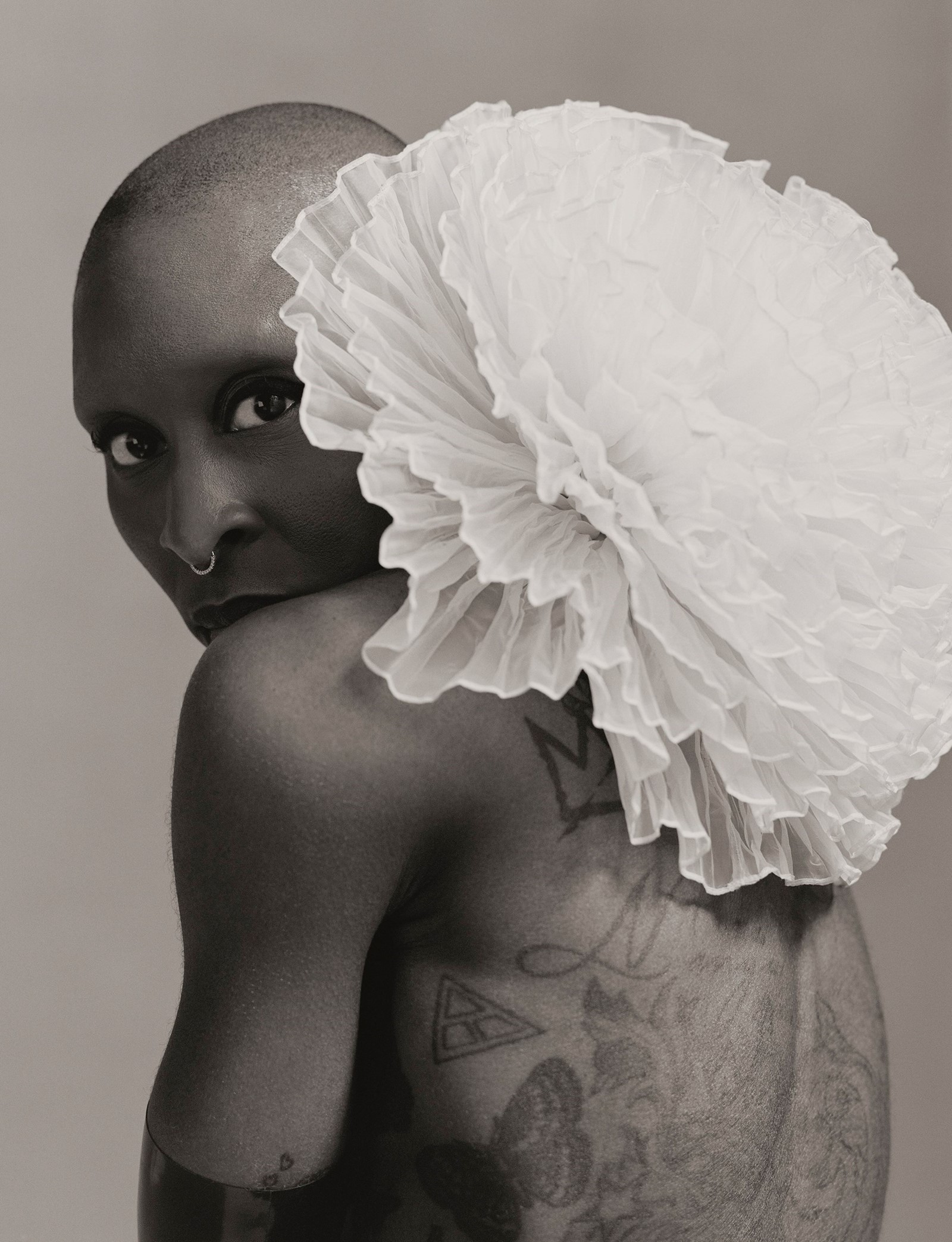
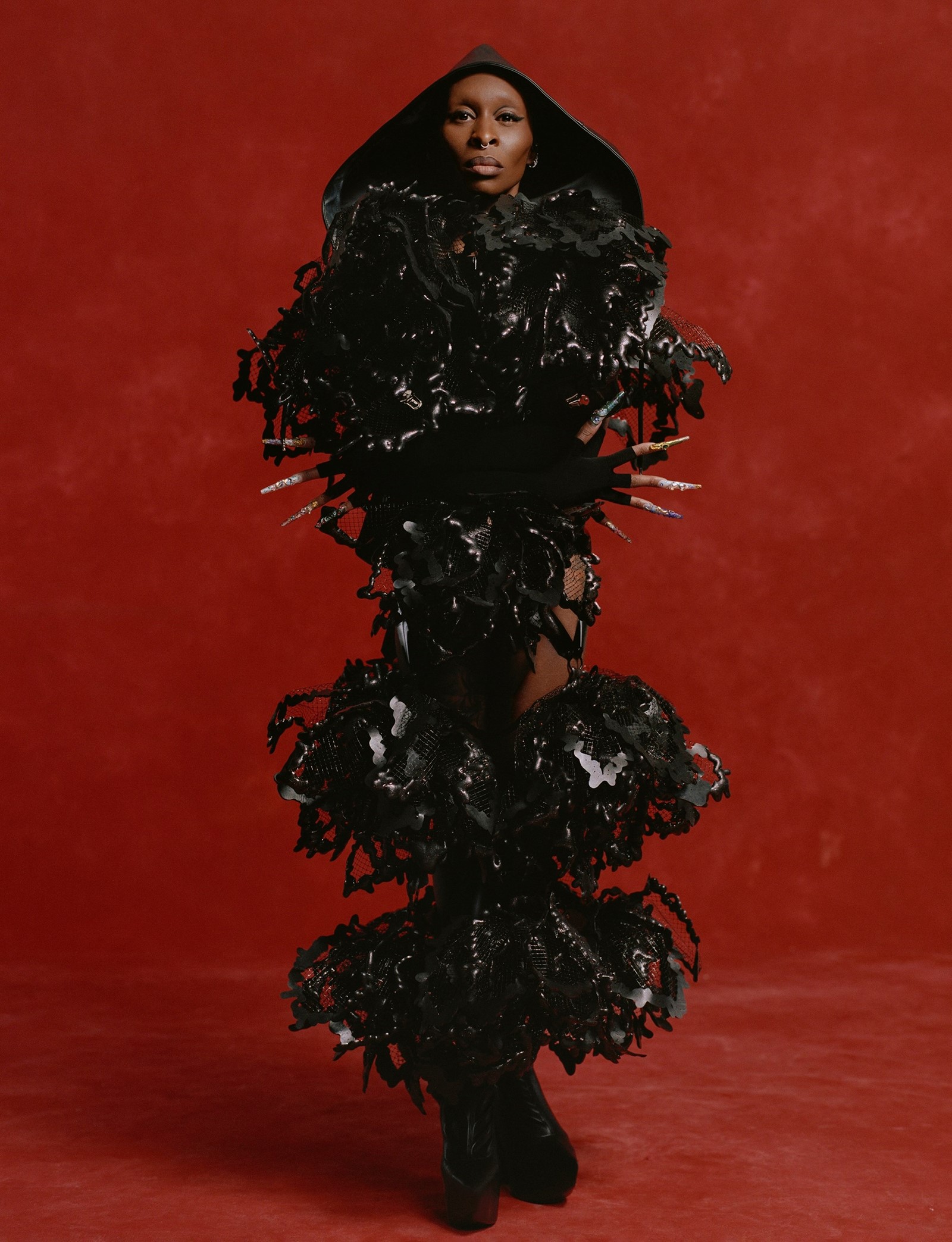
CE: I needed something that was easy for Holly. She’s from Chicago. She doesn’t really have a lot of time to do anything. The thing about box braids is that you can do them quickly. And the nails were a simple almond – easy, short. For Elphaba, those micro-braids take hours and hours and hours to do. But they move differently, like water. And I wanted that. I wanted it to still resemble what we see on stage, which is like the long black wig and the long waves, but for it to be connected to me as a Black woman. And the nails came from me loving them, yes, but also making sure they were accurate, because the original Wicked Witch of the West, Margaret Hamilton, had a set of talons. I was like, “Well, she didn’t just have them all of a sudden. Where did that come from?” They had to come from the DNA, from the beginning, so that you see them. I’m a stickler for details, from head to toe. If it doesn’t mean something, what is the point? Everybody has a reason for doing something with their hair, with their face, whatever it is. So why would that attention not be paid when it’s a character on screen?
But such attention! Erivo’s Wicked nails, on screen and off, will go down in pop-cultural history as the most enthralling fetish objects of 2024. I need to know more.
TB: How often do you do your nails?
CE: I’m getting them done tonight.
TB: And how long do you have them when they’re done?
CE: That depends on what’s going on. Sometimes, if there’s a long stretch of time where I’m not doing very much, I can have them done for two, three weeks and not change them. And if there’s lots of stuff going on, I like to try to change it up so that there’s new things to look at. It’s my birthday tomorrow [January 8, the same day as Bowie and Elvis. The company she keeps!] and I’m getting them done for that. It is a lovely, delightful thing for me, because it’s the one time where I’m sitting in one place and I don’t have to go anywhere, and I can either do catch-up on emails, catch-up on TV or film, speak to people I haven’t spoken to for a long time and just be in one place. I really like that. Also, and I know this sounds ridiculous, but I’ve really enjoyed people getting into it. I’ve really enjoyed that people are excited about my nails.
TB: What do they ask?
CE: They just want to see what I’ve done, how long it takes, what design I have on them, what the inspiration was, what’s underneath them. I’ve got these ones that have been made to look like actual crystals.
TB: And what is underneath?
CE: My own nails are long-ish, but not as long.
TB: And how do you do things with those nails?
CE: When I type I use the nails like my fingers. When I’m using my phone, it’s the pads of my fingers.
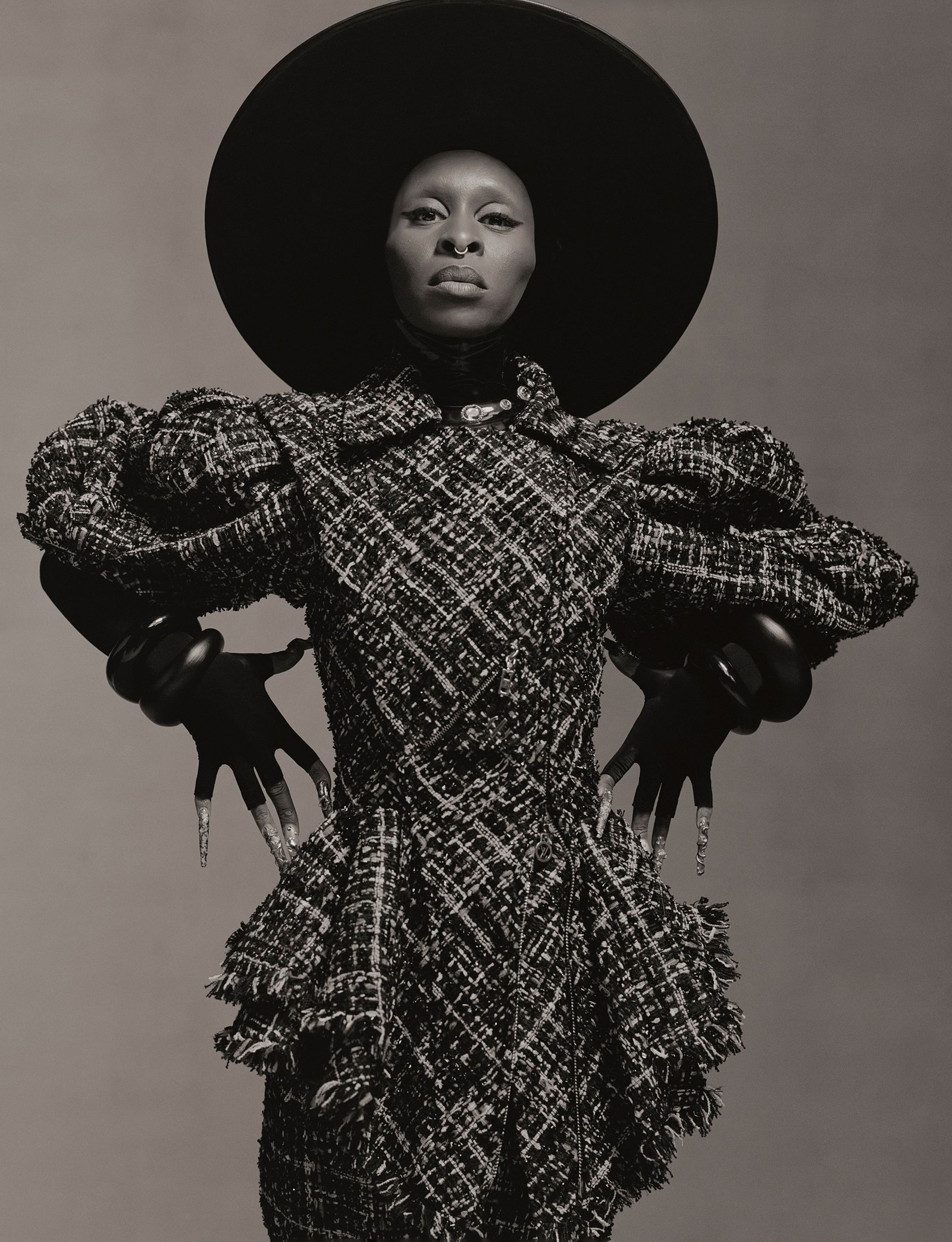
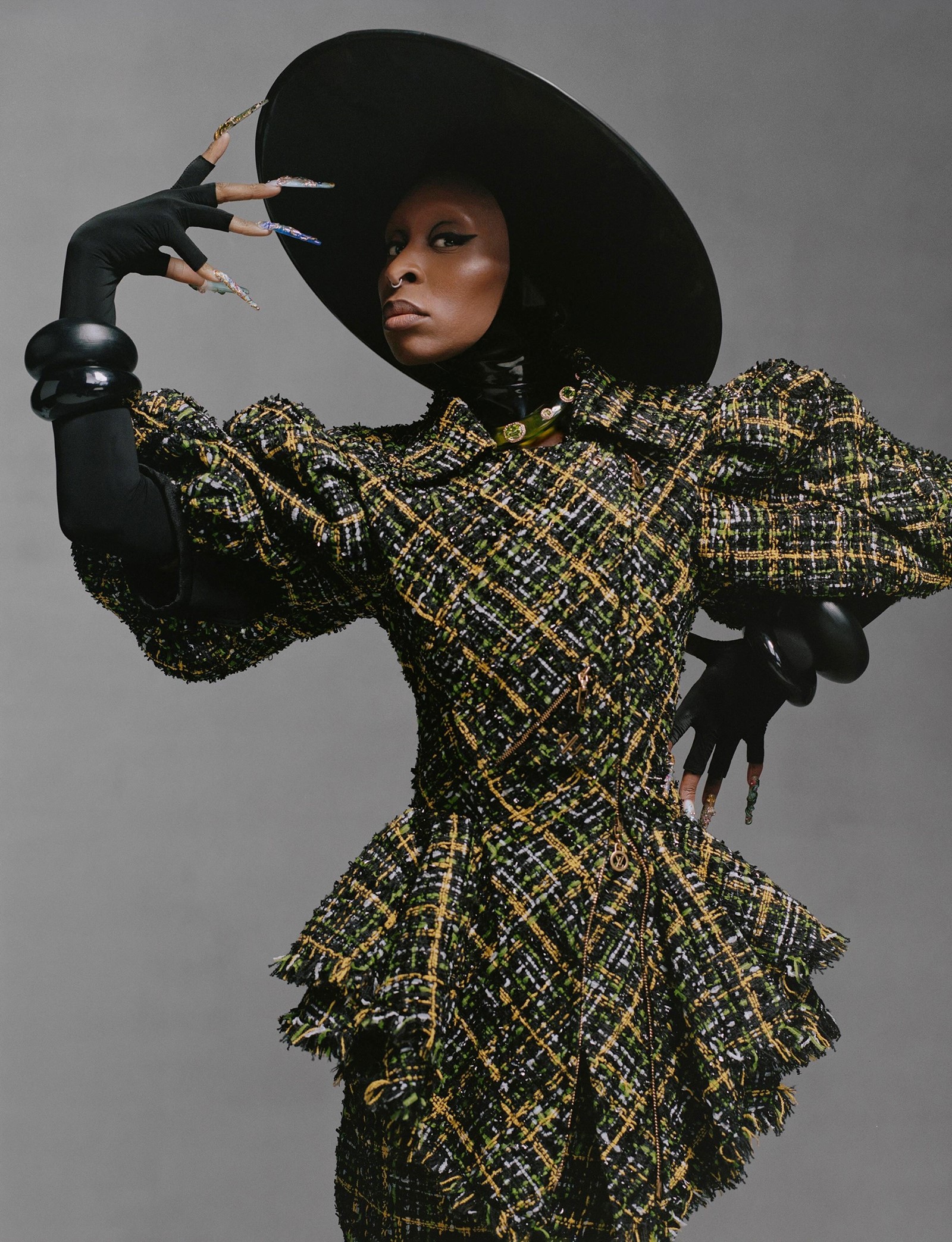
There have been three people in Erivo’s relationship with her nails: Erivo herself, of course; her nail technician, Shea Osei; and her Wicked co-star Ariana Grande. Together they created one of last year’s most meme-able moments when, during an interview with the queer journalist Tracy Gilchrist, the concept of ‘holding space’ slipped into the popular vernacular. Erivo and Grande’s reaction to the line of questioning was the stuff of performance art. At one point Grande shows her support by clutching one of her co-star’s talons in lieu of a comforting hand.
“She was letting me know she was there for me,” Erivo says now. “I wish I’d been there for her. I understood that. I can feel her holding my finger and I’m not moving my hand, because that’s what it is and I’m trying to catch up and trying to figure it out. And at first I thought I understood and then I didn’t understand at all. And we’re both just, we’re gonna go with it in this moment and whatever happens we’re just gonna be together.” Erivo and Grande’s togetherness has been one of the great love stories of the year. They first met after they’d been cast.
CE: That feels so strange because it’s like I’ve known her forever. I don’t think people realise that’s not a natural occurrence on a film set. It doesn’t happen very often. Yes, you make friends on a film, and acquaintances, you get close to people, but this, this kind of connection, doesn’t happen often.
TB: How would you describe the bond?
CE: Really honest and loving. I think some people may think it’s sort of frilly and sweet and saccharine, but actually it’s real. You know, we can talk about anything. We can talk about nothing. We can sit in silence and be very aware of each other. If I’m feeling insecure about something, I’m worried about something, I can call her. If she’s feeling insecure about something or she’s worried about something, she can call me. It’s not the surface stuff – we stopped doing that on day one.
“There’s a deep understanding of what it feels like when you don’t fit … What it feels like to know what your responsibility is and to have to be brave enough to take it” – Cynthia Erivo
TB: Is this something unusual for you?
CE: No, I’m particular about my friends. This is the kind of friendship I like. I don’t have loads of friends, 20 maximum, because I want to know them. I want to understand them and I want to be there for them.
TB: When [the French director] Jacques Audiard was picking up his Globe the other night [for Emilia Pérez], he talked about the importance of sisterhood. He said, “If there were more sisters in the world, it might be a better place.” I thought of you two.
CE: I loved that moment in his speech, because I really agree. I think, as women, we should be better at seeking sisterhood. Sisterhood is not the same as just a friend. It’s a person you can look at and go, “How do I do this? Can you teach me this? And I can teach you.” There’s always someone who might know a bit more than you do and can help you on your way, wherever that might be.
TB: It’s sad that Hollywood still likes pitting women against each other, though, and you two are in a movie where there’s a debate about awards. The same thing is happening with the female leads in Emilia Pérez. Do you think people expected a competitive element in your relationship?
CE: We spoke about it at the beginning and we said, “Never. We’re not doing it.” When we talk about the conversations that we’ve had, when we talk about the pacts that we make, when we talk about the promises we made to each other, those aren’t just soundbites. That’s a real conversation. No one’s comments, no one’s views should ever be allowed to fracture this relationship.
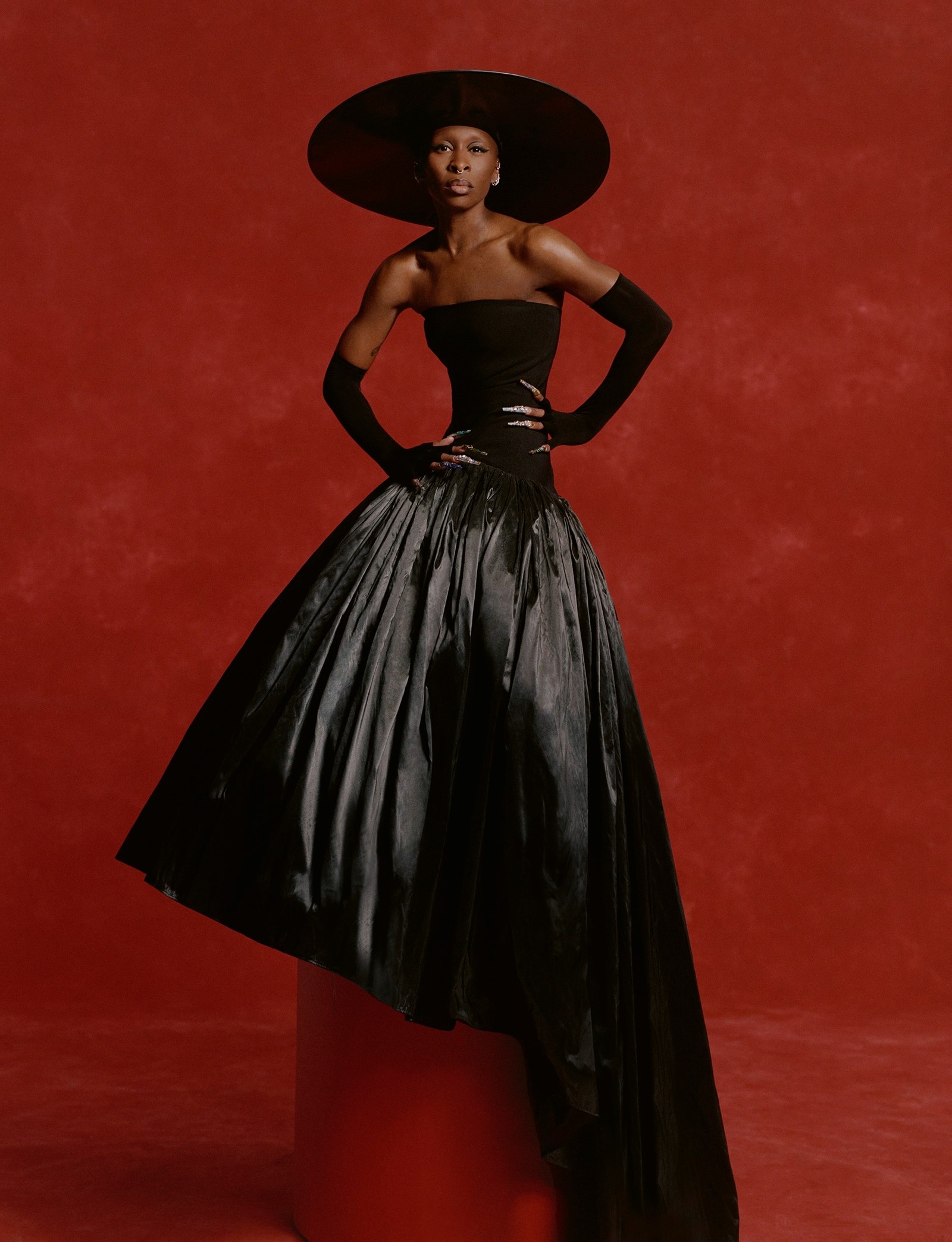
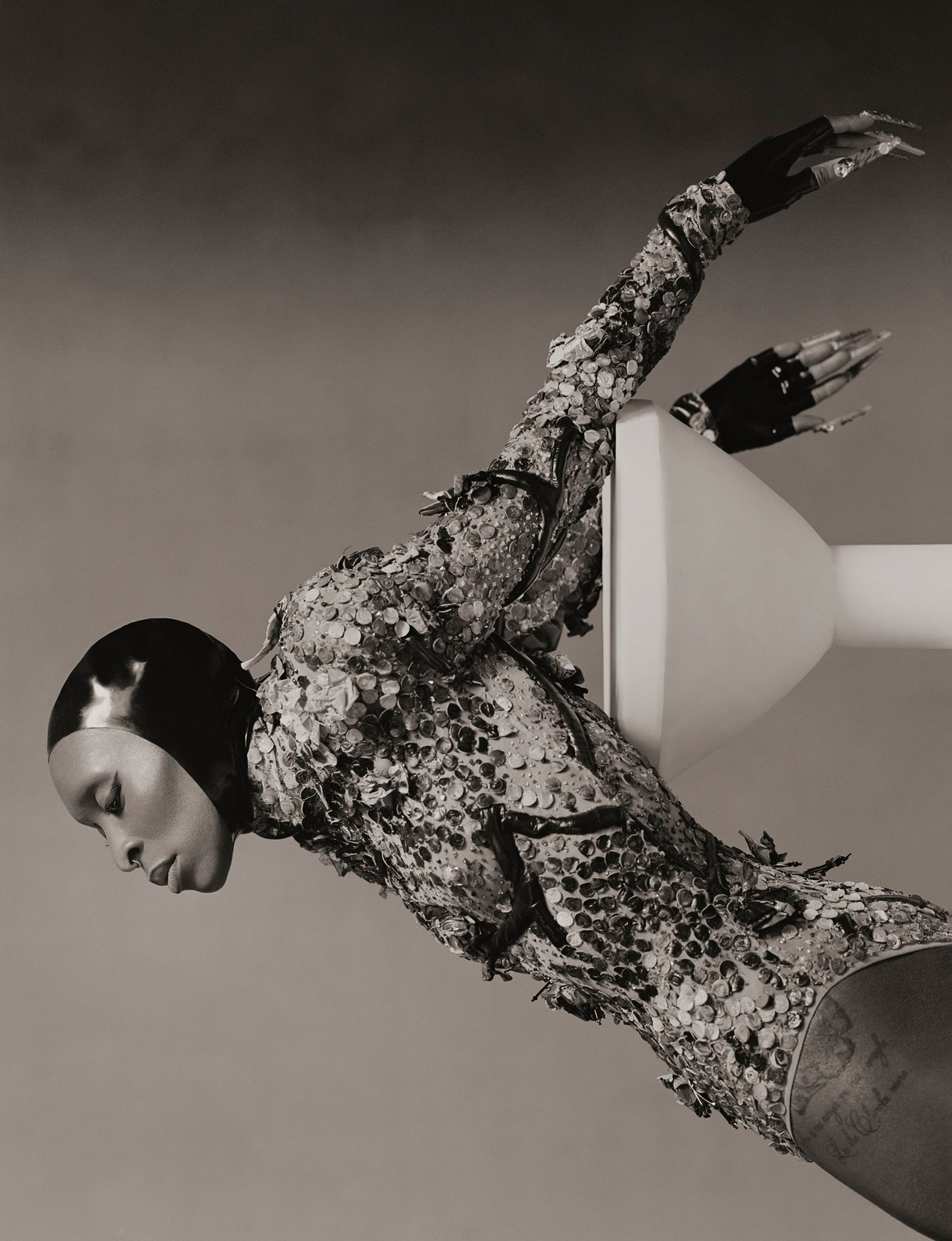
TB: What’s the game plan now?
CE: Game plan? I think I’ve got a couple more films under my belt to be in. I’ve produced my first film already. Drift [2023] is a little indie movie, and I’m really proud of it – it’s been a lovely example of what my taste is and how I function as a producer. My production company [Edith’s Daughter] has just signed a deal with Universal so that opens the doors immensely. We have a series at Apple and we’re very close to a green light. I’m tempted to direct an episode of that.
TB: What’s the reservation?
CE: I haven’t done it before. But that’s never really been a reservation for me. I’ve really enjoyed watching directors. I’m curious when I’m on sets. I love asking questions. I love discovering and understanding what’s going on and how things work. And if that wasn’t a passion that kept coming up, I would know it wasn’t for me. On Wicked, Michelle [Yeoh, who plays Madame Morrible] sidles up to me and says, “So when are you going to direct?” And it came out of nowhere. I feel like she’s this sage, psychic goddess of a woman who just knows things, so I’m inclined to believe in what I’m feeling and in what she senses.
TB: What about working with Ariana again?
CE: Whenever she asks, whatever she wants.
TB: Could you imagine directing her?
CE: That would be amazing [Enthusiasm reigns!]. Yeah, that would be amazing. I would love to do that.
TB: Continuing in the amazing vein, you really are the vice president of Rada and you also teach masterclasses there?
CE: I really am and I really do. Every year I spend a week or two at the school. I work with the third years, and now we’re trying to implement it so that I can work with the first years through the third. I’ve been doing it for years now, actually. I just didn’t tell anyone.
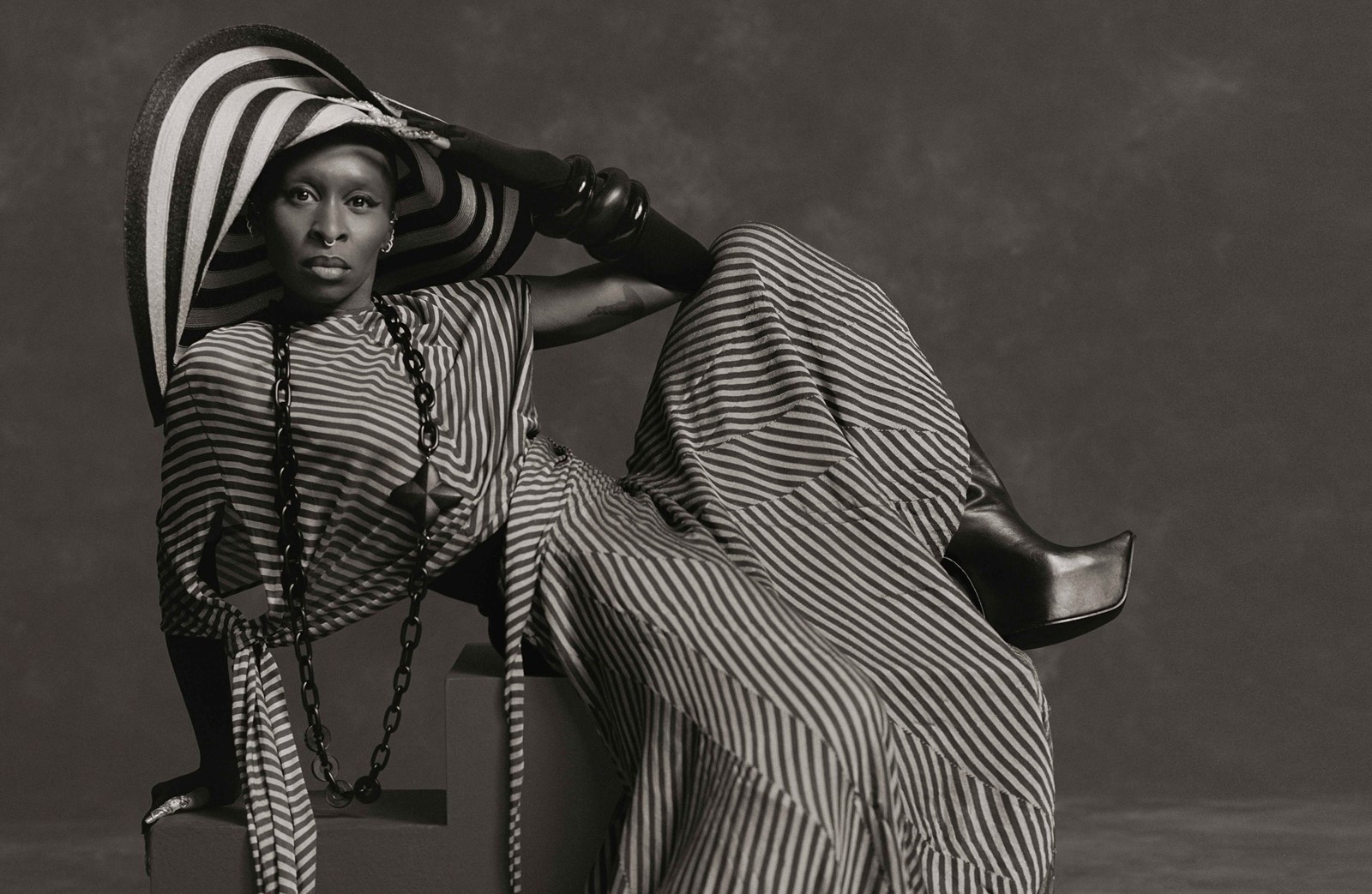
TB: Did you resist or embrace acting school?
CE: It was varied for me. I don’t wholly reject it. I think I got my backbone by being at Rada. My acting teacher was a little angel for me. She was the one who made me understand that, actually, my strongest suit is vulnerability. If I seek out what the character wants through the eyes of vulnerability, then everything else will fall into place. And that changed everything for me. It made me understand things very differently. And then there were other times at the school where I really didn’t feel understood. But that is also helpful for me, going back to the school with new students, because I can be gentle. I am aware of how hard it is to be at drama school, because the ground gets taken out from underneath you for a little bit. The things you thought were your foundation sort of go away. I guess my raison d’etre when I go into the school is to try to help you put things back together. I teach something called Performance Through Song, but it’s really about connecting the dots using a song. Not just presenting a song, but sharing it, meaning it, which then pulls in all the lessons the students have been learning about themselves as an actor – diction, projection, all those things. The way you see the world, the way you see other people … Using your imagination, connecting it to personal experience, not being afraid to make those connections.
TB: So, acting and singing are your eyes and ears, in a way.
CE: I don’t think I would be able to choose between them. They are like identical twins for me because I wouldn’t leave one behind. I miss one when I’m doing the other.
“It’s a conversation about racism, but it’s also a conversation about anyone who’s been othered. It’s a conversation about queerness” – Cynthia Erivo
It’s a symbiosis in full dazzling effect as early on as Erivo’s second movie, Bad Times at the El Royale. In the hugely underrated 2018 thriller she plays an R&B singer named Darlene Sweet, whose a capella renditions of the classics You Can’t Hurry Love and Unchained Melody propel the plot, culminating in a final, redemptive performance of Hold On, I’m Comin’. Singing saves Darlene, as it does Elphaba in Wicked’s grand finale (Defying Gravity upside down! On a broomstick!). It’s a complete consummation of Erivo’s gale-force power as a performer. But there is also something about the element of heartbreak in a classic musical – West Side Story, Carousel, you name it – that syncs with the air of melancholy that shades all her performances.
The triumph, when it comes for Elphaba or Darlene, or Holly Gibney or Harriet Tubman for that matter, is hard-won, at great emotional cost.
CE: I put it down to a particular occurrence in my teenage years, which was being publicly disowned by my dad. That moment shut me off for a little bit. And so the work became about proving I could be loved, proving I was lovable, proving I was good enough. And at some point, it really works. It’s good fire, right? Until it stops being good fire and starts being detrimental to the work, because it becomes about the wrong thing. So when I was able to sit with someone and start processing all that, it meant that I could actually see things through empathy. And when you can empathise, the anger goes away a little bit. And when the anger goes away, your heart opens just a little bit more. When your heart opens a little bit more, you become more available and things just look different. I don’t think I could have done this role five, six, seven years ago. I don’t think I would have been open enough to do it. I don’t think I would have had enough empathy.
As a former student of La Retraite Roman Catholic Girls’ School in Clapham Park, southwest London, Erivo has also had recourse to the oldest ‘therapist’ of all.
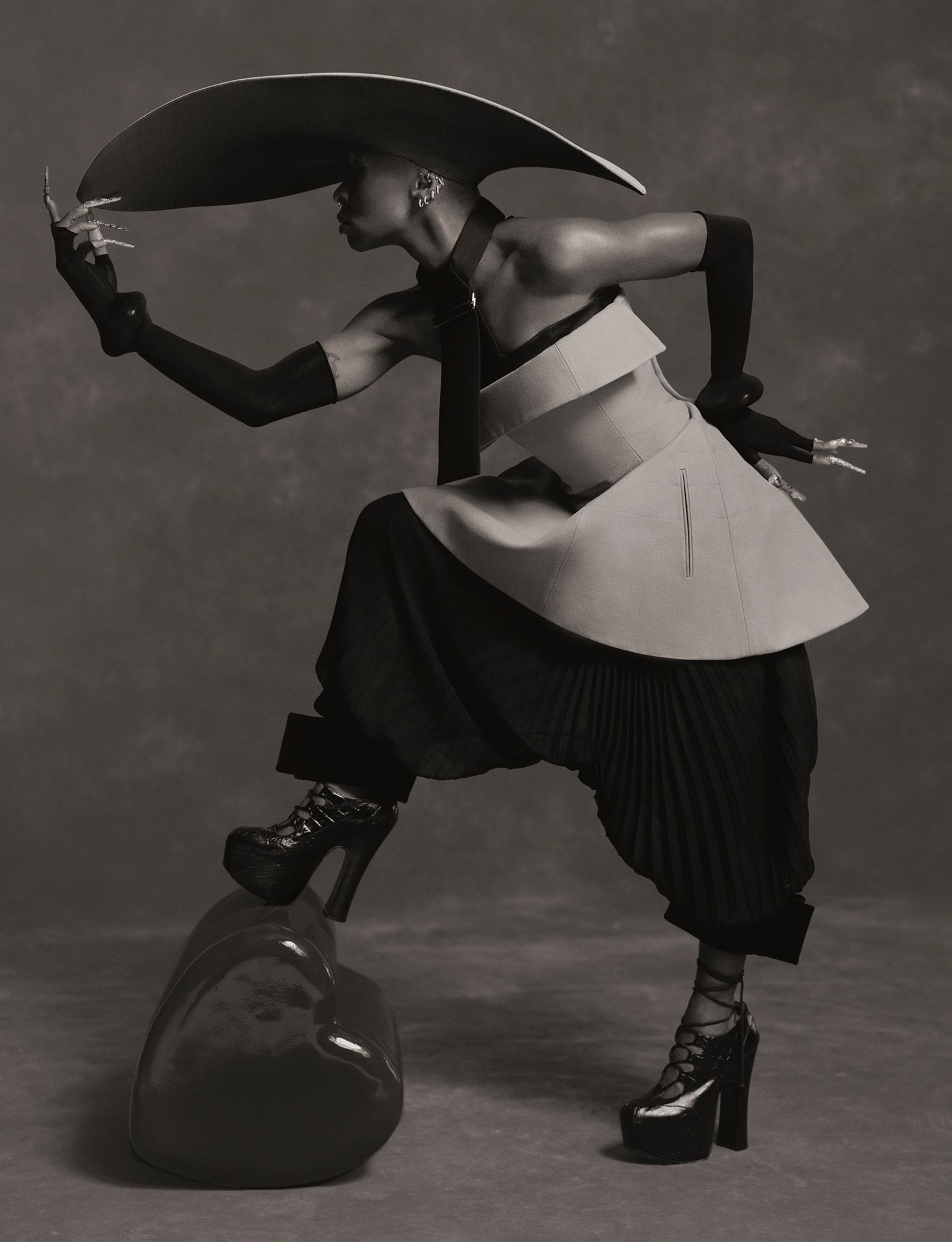
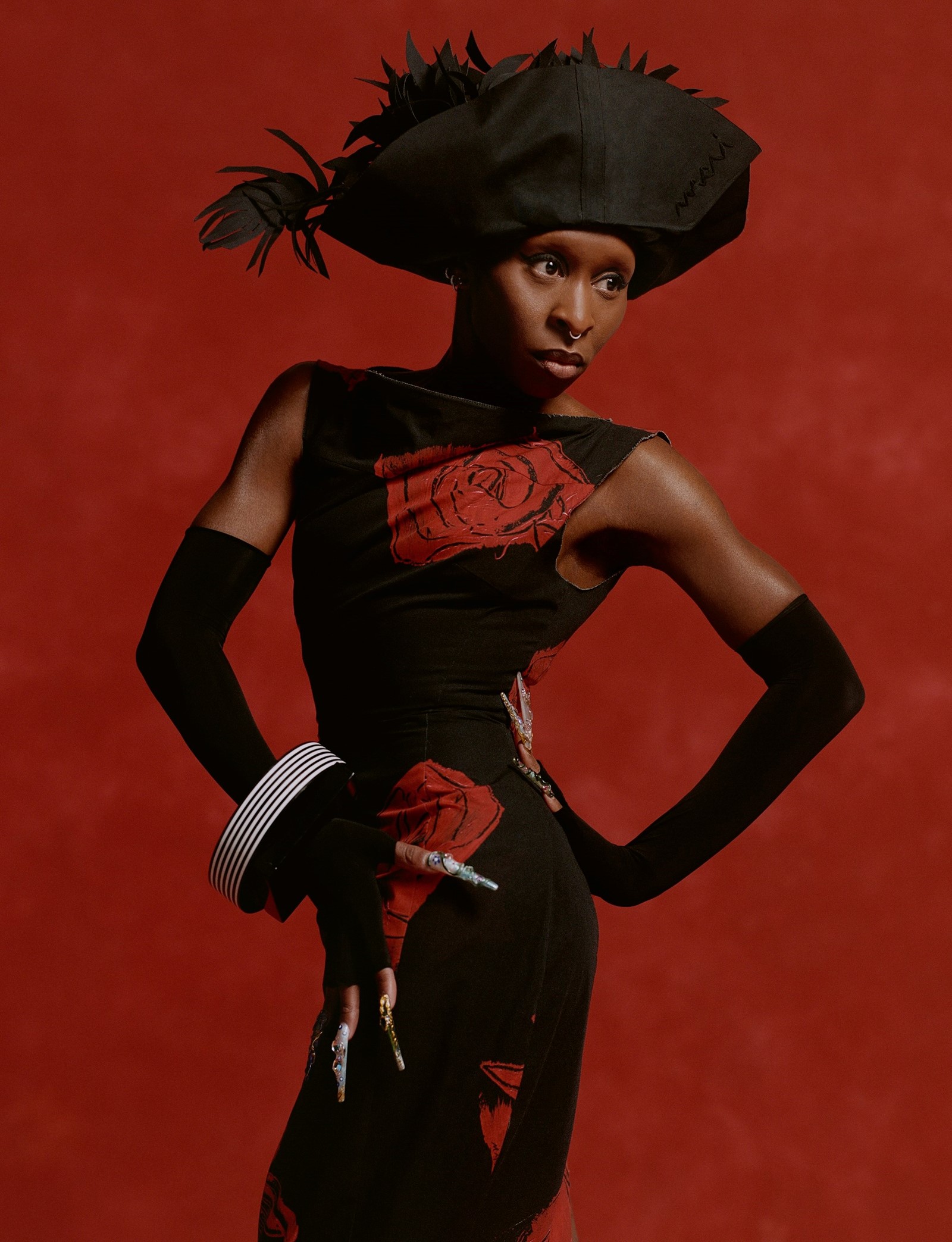
TB: Has your faith been a support for you?
CE: Yeah. I think too many wonderful things have happened, even through dark times, to not believe that something bigger than myself is at work. I think I am being taken care of by more than just me and the friends around me, and my mum and my family. It’s hard to explain, but I always feel like there’s something else at work. Like, deep in my soul. Deep in me. I feel like that’s the truth. And I can only describe it as God, because I don’t know what else to call it. So, for me, it’s that.
Make-up: Joanna Simkin at The Wall Group using HOURGLASS. Manicure by Shea Osei. Set design: Jacob Burstein at MHS Artists. Photographic assistants: Marion Grand and James Gilbert. Styling assistant: Precious Greham. Make-up assistant: Noelle Brown. Seamstress: Hailey Desjardins. Production: Mini Title. Producer: Cat Lewis. Production assistant: Alessandra Soler. Post-production: Touch. Special thanks to Pier59 Studios
This story features in the Spring/Summer 2025 issue of AnOther Magazine, which is on sale internationally on 6 March 2025. Pre-order here.
in HTML format, including tags, to make it appealing and easy to read for Japanese-speaking readers aged 20 to 40 interested in fashion. Organize the content with appropriate headings and subheadings (h1, h2, h3, h4, h5, h6), translating all text, including headings, into Japanese. Retain any existing
tags from
Lead ImageJacket and trousers in cotton silk by LOUIS VUITTON. Hat and hood in latex by ATSUKO KUDO. Her own nose ring. Choker in acetate with crystals by SWAROVSKI. Stylist’s own gloves. Bangle in resin by DINOSAUR DESIGNS. And bangles in Lucite by ALEXIS BITTARPhotography by Nadine Ijewere, Styling by Katie Shillingford
This article is taken from the Spring/Summer 2025 issue of AnOther Magazine:
Our first meeting was chance. Cynthia Erivo was in Thom Browne’s showroom in Paris last March, picking out looks for a press tour for her forthcoming movie, Wicked.
When we next meet, nine months later, over Zoom this time, the world has changed for her. “Just a little bit, yeah,” the 38-year-old acknowledges with a dry laugh.
Wicked has been Hollywood’s salvation, a box office titan, with a global gross thus far of over $700 million. And Erivo has just hit her first red carpet of awards season, for the Golden Globes, where she was nominated for best actress in a comedy or musical (she has since received an Oscar nomination too). In the past she has often found award shows nerve-racking. But that is also different now.
Erivo has joined the pantheon, via her role as the green-skinned Wicked Witch of the West in one of the most celebrated and enduring fairy tales of modern times. The witch in the original film adaptation guaranteed nightmares into adulthood for generations of young innocents. Wicked is a revisionist text, recasting evil as persecuted otherness. And that’s how an all-singing, all-dancing Hollywood musical becomes an unexpectedly subversive commentary on a world where the swelling tide of authoritarianism is chillingly reflective of the moment in history when The Wizard of Oz first appeared on movie screens, in 1939. Erivo’s witch, Elphaba, finds common cause with the downtrodden souls of Oz.
Even though Wicked is the second most successful musical in Broadway history and has been on stage for more than 20 years, including playing at the Apollo Victoria in London since 2006, I didn’t know it at all. But this was a rare instance when ignorance actually was sheer bliss. Which felt like a launchpad for our conversation.
Tim Blanks: I blush to admit I had no idea what to expect from Wicked.
Cynthia Erivo: I don’t think people do, and that might be what’s catching people unawares. I think people go in expecting a light, fun time and they come out moved, which is wonderful, the idea that you really can do both. We want people to go in and enjoy themselves. We want people to sing, to dance, but we also want them to understand that humanity exists and that we can do better as human beings, do better with each other. We can change our minds. We can be brave. We can. We can go beyond what the expectations of ourselves are.
TB: Speaking of … You appeared on Graham Norton when you’d just done the Aretha miniseries [National Geographic’s Genius: Aretha] – you were a London girl talking one second and the next you’re Aretha Franklin singing I Never Loved a Man. From one second to the next. Goosebumps don’t even begin to describe how I felt. I was sitting there thinking, how do you inhabit someone so totally and then leave their house and move into a new character? How do you do that?

CE: I don’t know. Sometimes it’s difficult. I’m not entirely sure that they leave my house after I’ve left theirs. I think I always leave with a little bit of them with me, they’re always there beneath the surface. I don’t know how not to give each of the characters an actual part of myself. I don’t know how not to pour myself into the character. I think I’ve got very good at making sure that I take the time at the end of these projects to let them go a little bit and make some space for myself to come back in. I want to be able to give myself fully to whichever character comes along next. I think it’s because I really do care deeply about each of these characters. They become people I love.
TB: Have you ever played anyone you didn’t like?
CE: No, I don’t think so. And I don’t think that will ever be the case. Even if I play a villain, I reserve judgment, because they’re a human being. I can’t judge that character because I have to be them. I have to believe what they believe and that they are fully justified in what they’re doing. And if I believe they’re fully justified, unless the character innately doesn’t like themselves, then I doubt that I wouldn’t like them.
TB: That sounds emotionally taxing. To do that as a job … How do you cope? Is that why you run marathons?
CE: I think it is. I think it’s why I started running and walking long distance. It was a wonderful way to meditate, to process and to let go of some things. I have an amazing therapist. But it does take a second. Like, my heart always aches at the end of something. I find it hard to leave at the end of a piece. Really hard.
TB: So Wicked is quite a different experience for you, because you were so submerged in the creation of it, and with Wicked 2 [Wicked: For Good] on the horizon you will be equally taken up with the promotion of it for another year. Tell me about that experience.
CE: It’s been wild, because it’s not really ever letting Elphaba go completely, because when I have these conversations she’s still right there at the surface. And even having to go back to the second film, and rewatching and reliving some of those moments, is going to be another wild and crazy experience. We’ve only just come past the first and, even now, we’re still talking about it and we’re still moving through it. And I think what keeps it with me is all the conversations I keep having with people who I’ve never met before, people who come up to me in the middle of the street and say, “Hey, I saw the film, I don’t feel alone any more.” I recognised that. I got a text from a friend of mine. He said, “My ninety something grandmother went to see the film and she sobbed, ‘It’s the first time I’ve seen myself on screen.’”
TB: And what they’re seeing is a green witch! That is the amazing thing.
CE: It’s a green witch. But I think what they see also is so many parts of me. There’s a deep understanding of what it feels like when you don’t fit, what it feels like to constantly want to be accepted and not be accepted, what it feels like to know what your responsibility is and to have to be brave enough to take it, what it feels like to feel like you have more to offer but nobody believes that you have that in you. All of those things that this character and I both innately understand, I think other people are also seeing and understanding. And we talk about the braids and the nails. Because, yes, the green is there, but those braids tell you something different as well. There’s also the added wonderful thing of Black women seeing themselves on screen. They see themselves flying on screen. And we just don’t see that very often.


TB: You have talked about how being bullied as a child informed Elphaba’s experience in the film. I’m thinking in particular of the solo dance scene at the Ozdust Ballroom [a soaring emotional high point in Wicked].
CE: In my late teens I definitely walked into a room and felt like I wasn’t meant to be there.
TB: Did you claim your space?
CE: I don’t think I did. I don’t think I knew how to. I think this role gave me the chance to. I guess that dance was for me and for Elphaba, and for anyone who has never been able to take back their space. I’m aware now of how different I am, whether it’s what I look like or how I see fashion or how I see music. And I nurture those differences. I don’t try to hide them. I’m very comfortable sitting here in front of you, no make-up, no eyebrows, nothing. I remember the decision I made when I was at drama school, wanting people to see more of my face and going, “I don’t think I have any use for hair. I’m just going to cut it short.” And it’s been getting shorter and shorter until Wicked, and the only way to make sure that that wig made sense was to shave my head and we airbrushed the green paint onto my scalp. We airbrushed my entire head. For Aretha I had to shave my eyebrows halfway. I kind of liked it. And then I was like, oh, maybe I don’t need eyebrows either. The more it’s weird, the more I let go, the more I feel like myself. Right in this moment I feel very much like me.
TB: Well, that’s acting as therapy, isn’t it?
CE: I do think so. I think that it’s therapy for the actor, but it’s also a wonderful way to channel emotions you haven’t necessarily been able to use, feelings you haven’t been able to express. If you can put them in a vessel that can actually express them for you, they don’t live in you as much.
“I’m aware now of how different I am … And I nurture those differences. I don’t try to hide them. I’m very comfortable sitting here in front of you, no make-up, no eyebrows, nothing” – Cynthia Erivo
TB: Do you think the green skin allowed you to express your feelings about racism in a much more graphic way? Without giving people what they’ve seen from you in the past – Harriet Tubman’s experience of racism, or Celie’s experience in The Color Purple – you distil the experience into something much more comprehensible. It’s hard to put my finger on it exactly. It’s literally alien.
CE: The green skin is like the umbrella under which the ‘other’ lives. So yes, it’s a conversation about racism, but it’s also a conversation about anyone who’s been othered. It’s a conversation about queerness. The green sets Elphaba apart from everybody else. She is the ultimate other. And I think there’s this added responsibility because I’m a Black woman underneath that green, so we can also really have the conversation about what it’s like to be a Black woman when nobody wants you there. I mean, you’re gonna have a frank conversation. And I think the wildest thing is that people are. People are raising their hand, going, “I felt like that, I know what that is.”
Wicked’s director, Jon M Chu, observed that Wicked: For Good, arriving this November, will likely be even more relevant than its predecessor, given what’s happening in America now. But Erivo has already displayed a knack for timeliness in her career. She went to New York in 2015 with the Menier Chocolate Factory’s production of The Color Purple and won a Tony the following year, the same year that Hamilton blew the roof off Broadway. “It landed right when it was meant to land,” Erivo says. Her performance as the American abolitionist and activist Harriet Tubman won her an Oscar nomination for best actress in 2020. “It did what it did when it needed to do it,” she adds. “And now this. I think I definitely have a little guardian angel going, ‘Do that, pick this.’”
At this point I’d like to extend a special thank you to Erivo’s guardian angel for bringing her to the HBO series The Outsider, in which the private detective Holly Gibney, a character written by the author Stephen King as a white woman with Lithuanian roots, was recast at the request of producer and co-star Jason Bateman as a Black woman from Chicago, specifically because he wanted to work with Erivo. It’s a role she says she’d go back to “in a heartbeat”.
What instantly stands out in a reacquaintance with The Outsider is Erivo’s nails and hair. They’re a polite preview of Elphaba’s micro-braids and talons in Wicked, which almost demand a co-starring credit of their own.


CE: I needed something that was easy for Holly. She’s from Chicago. She doesn’t really have a lot of time to do anything. The thing about box braids is that you can do them quickly. And the nails were a simple almond – easy, short. For Elphaba, those micro-braids take hours and hours and hours to do. But they move differently, like water. And I wanted that. I wanted it to still resemble what we see on stage, which is like the long black wig and the long waves, but for it to be connected to me as a Black woman. And the nails came from me loving them, yes, but also making sure they were accurate, because the original Wicked Witch of the West, Margaret Hamilton, had a set of talons. I was like, “Well, she didn’t just have them all of a sudden. Where did that come from?” They had to come from the DNA, from the beginning, so that you see them. I’m a stickler for details, from head to toe. If it doesn’t mean something, what is the point? Everybody has a reason for doing something with their hair, with their face, whatever it is. So why would that attention not be paid when it’s a character on screen?
But such attention! Erivo’s Wicked nails, on screen and off, will go down in pop-cultural history as the most enthralling fetish objects of 2024. I need to know more.
TB: How often do you do your nails?
CE: I’m getting them done tonight.
TB: And how long do you have them when they’re done?
CE: That depends on what’s going on. Sometimes, if there’s a long stretch of time where I’m not doing very much, I can have them done for two, three weeks and not change them. And if there’s lots of stuff going on, I like to try to change it up so that there’s new things to look at. It’s my birthday tomorrow [January 8, the same day as Bowie and Elvis. The company she keeps!] and I’m getting them done for that. It is a lovely, delightful thing for me, because it’s the one time where I’m sitting in one place and I don’t have to go anywhere, and I can either do catch-up on emails, catch-up on TV or film, speak to people I haven’t spoken to for a long time and just be in one place. I really like that. Also, and I know this sounds ridiculous, but I’ve really enjoyed people getting into it. I’ve really enjoyed that people are excited about my nails.
TB: What do they ask?
CE: They just want to see what I’ve done, how long it takes, what design I have on them, what the inspiration was, what’s underneath them. I’ve got these ones that have been made to look like actual crystals.
TB: And what is underneath?
CE: My own nails are long-ish, but not as long.
TB: And how do you do things with those nails?
CE: When I type I use the nails like my fingers. When I’m using my phone, it’s the pads of my fingers.


There have been three people in Erivo’s relationship with her nails: Erivo herself, of course; her nail technician, Shea Osei; and her Wicked co-star Ariana Grande. Together they created one of last year’s most meme-able moments when, during an interview with the queer journalist Tracy Gilchrist, the concept of ‘holding space’ slipped into the popular vernacular. Erivo and Grande’s reaction to the line of questioning was the stuff of performance art. At one point Grande shows her support by clutching one of her co-star’s talons in lieu of a comforting hand.
“She was letting me know she was there for me,” Erivo says now. “I wish I’d been there for her. I understood that. I can feel her holding my finger and I’m not moving my hand, because that’s what it is and I’m trying to catch up and trying to figure it out. And at first I thought I understood and then I didn’t understand at all. And we’re both just, we’re gonna go with it in this moment and whatever happens we’re just gonna be together.” Erivo and Grande’s togetherness has been one of the great love stories of the year. They first met after they’d been cast.
CE: That feels so strange because it’s like I’ve known her forever. I don’t think people realise that’s not a natural occurrence on a film set. It doesn’t happen very often. Yes, you make friends on a film, and acquaintances, you get close to people, but this, this kind of connection, doesn’t happen often.
TB: How would you describe the bond?
CE: Really honest and loving. I think some people may think it’s sort of frilly and sweet and saccharine, but actually it’s real. You know, we can talk about anything. We can talk about nothing. We can sit in silence and be very aware of each other. If I’m feeling insecure about something, I’m worried about something, I can call her. If she’s feeling insecure about something or she’s worried about something, she can call me. It’s not the surface stuff – we stopped doing that on day one.
“There’s a deep understanding of what it feels like when you don’t fit … What it feels like to know what your responsibility is and to have to be brave enough to take it” – Cynthia Erivo
TB: Is this something unusual for you?
CE: No, I’m particular about my friends. This is the kind of friendship I like. I don’t have loads of friends, 20 maximum, because I want to know them. I want to understand them and I want to be there for them.
TB: When [the French director] Jacques Audiard was picking up his Globe the other night [for Emilia Pérez], he talked about the importance of sisterhood. He said, “If there were more sisters in the world, it might be a better place.” I thought of you two.
CE: I loved that moment in his speech, because I really agree. I think, as women, we should be better at seeking sisterhood. Sisterhood is not the same as just a friend. It’s a person you can look at and go, “How do I do this? Can you teach me this? And I can teach you.” There’s always someone who might know a bit more than you do and can help you on your way, wherever that might be.
TB: It’s sad that Hollywood still likes pitting women against each other, though, and you two are in a movie where there’s a debate about awards. The same thing is happening with the female leads in Emilia Pérez. Do you think people expected a competitive element in your relationship?
CE: We spoke about it at the beginning and we said, “Never. We’re not doing it.” When we talk about the conversations that we’ve had, when we talk about the pacts that we make, when we talk about the promises we made to each other, those aren’t just soundbites. That’s a real conversation. No one’s comments, no one’s views should ever be allowed to fracture this relationship.


TB: What’s the game plan now?
CE: Game plan? I think I’ve got a couple more films under my belt to be in. I’ve produced my first film already. Drift [2023] is a little indie movie, and I’m really proud of it – it’s been a lovely example of what my taste is and how I function as a producer. My production company [Edith’s Daughter] has just signed a deal with Universal so that opens the doors immensely. We have a series at Apple and we’re very close to a green light. I’m tempted to direct an episode of that.
TB: What’s the reservation?
CE: I haven’t done it before. But that’s never really been a reservation for me. I’ve really enjoyed watching directors. I’m curious when I’m on sets. I love asking questions. I love discovering and understanding what’s going on and how things work. And if that wasn’t a passion that kept coming up, I would know it wasn’t for me. On Wicked, Michelle [Yeoh, who plays Madame Morrible] sidles up to me and says, “So when are you going to direct?” And it came out of nowhere. I feel like she’s this sage, psychic goddess of a woman who just knows things, so I’m inclined to believe in what I’m feeling and in what she senses.
TB: What about working with Ariana again?
CE: Whenever she asks, whatever she wants.
TB: Could you imagine directing her?
CE: That would be amazing [Enthusiasm reigns!]. Yeah, that would be amazing. I would love to do that.
TB: Continuing in the amazing vein, you really are the vice president of Rada and you also teach masterclasses there?
CE: I really am and I really do. Every year I spend a week or two at the school. I work with the third years, and now we’re trying to implement it so that I can work with the first years through the third. I’ve been doing it for years now, actually. I just didn’t tell anyone.

TB: Did you resist or embrace acting school?
CE: It was varied for me. I don’t wholly reject it. I think I got my backbone by being at Rada. My acting teacher was a little angel for me. She was the one who made me understand that, actually, my strongest suit is vulnerability. If I seek out what the character wants through the eyes of vulnerability, then everything else will fall into place. And that changed everything for me. It made me understand things very differently. And then there were other times at the school where I really didn’t feel understood. But that is also helpful for me, going back to the school with new students, because I can be gentle. I am aware of how hard it is to be at drama school, because the ground gets taken out from underneath you for a little bit. The things you thought were your foundation sort of go away. I guess my raison d’etre when I go into the school is to try to help you put things back together. I teach something called Performance Through Song, but it’s really about connecting the dots using a song. Not just presenting a song, but sharing it, meaning it, which then pulls in all the lessons the students have been learning about themselves as an actor – diction, projection, all those things. The way you see the world, the way you see other people … Using your imagination, connecting it to personal experience, not being afraid to make those connections.
TB: So, acting and singing are your eyes and ears, in a way.
CE: I don’t think I would be able to choose between them. They are like identical twins for me because I wouldn’t leave one behind. I miss one when I’m doing the other.
“It’s a conversation about racism, but it’s also a conversation about anyone who’s been othered. It’s a conversation about queerness” – Cynthia Erivo
It’s a symbiosis in full dazzling effect as early on as Erivo’s second movie, Bad Times at the El Royale. In the hugely underrated 2018 thriller she plays an R&B singer named Darlene Sweet, whose a capella renditions of the classics You Can’t Hurry Love and Unchained Melody propel the plot, culminating in a final, redemptive performance of Hold On, I’m Comin’. Singing saves Darlene, as it does Elphaba in Wicked’s grand finale (Defying Gravity upside down! On a broomstick!). It’s a complete consummation of Erivo’s gale-force power as a performer. But there is also something about the element of heartbreak in a classic musical – West Side Story, Carousel, you name it – that syncs with the air of melancholy that shades all her performances.
The triumph, when it comes for Elphaba or Darlene, or Holly Gibney or Harriet Tubman for that matter, is hard-won, at great emotional cost.
CE: I put it down to a particular occurrence in my teenage years, which was being publicly disowned by my dad. That moment shut me off for a little bit. And so the work became about proving I could be loved, proving I was lovable, proving I was good enough. And at some point, it really works. It’s good fire, right? Until it stops being good fire and starts being detrimental to the work, because it becomes about the wrong thing. So when I was able to sit with someone and start processing all that, it meant that I could actually see things through empathy. And when you can empathise, the anger goes away a little bit. And when the anger goes away, your heart opens just a little bit more. When your heart opens a little bit more, you become more available and things just look different. I don’t think I could have done this role five, six, seven years ago. I don’t think I would have been open enough to do it. I don’t think I would have had enough empathy.
As a former student of La Retraite Roman Catholic Girls’ School in Clapham Park, southwest London, Erivo has also had recourse to the oldest ‘therapist’ of all.


TB: Has your faith been a support for you?
CE: Yeah. I think too many wonderful things have happened, even through dark times, to not believe that something bigger than myself is at work. I think I am being taken care of by more than just me and the friends around me, and my mum and my family. It’s hard to explain, but I always feel like there’s something else at work. Like, deep in my soul. Deep in me. I feel like that’s the truth. And I can only describe it as God, because I don’t know what else to call it. So, for me, it’s that.
Make-up: Joanna Simkin at The Wall Group using HOURGLASS. Manicure by Shea Osei. Set design: Jacob Burstein at MHS Artists. Photographic assistants: Marion Grand and James Gilbert. Styling assistant: Precious Greham. Make-up assistant: Noelle Brown. Seamstress: Hailey Desjardins. Production: Mini Title. Producer: Cat Lewis. Production assistant: Alessandra Soler. Post-production: Touch. Special thanks to Pier59 Studios
This story features in the Spring/Summer 2025 issue of AnOther Magazine, which is on sale internationally on 6 March 2025. Pre-order here.
and integrate them seamlessly into the new content without adding new tags. Ensure the new content is fashion-related, written entirely in Japanese, and approximately 1500 words. Conclude with a “結論” section and a well-formatted “よくある質問” section. Avoid including an introduction or a note explaining the process.


